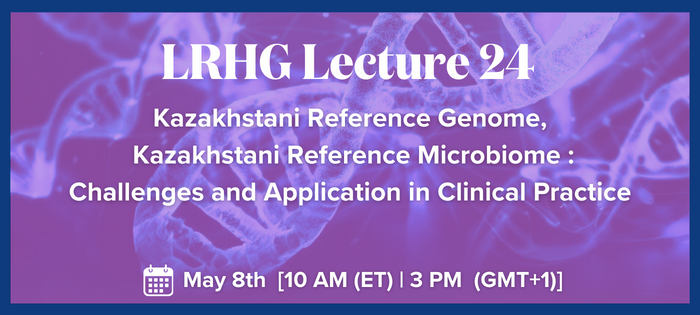Join us for the 24th lecture from the Logical Reasoning in Human Genetics series presented by Dr. Ainur Akilzhanova, Professor, Chief Research Scientist, Head of Laboratory of Genomic and Personalized Medicine, and Acting Director at the Center for Life Sciences, National Laboratory Astana at Nazarbayev University, Astana, Kazakhstan and Dr. Kushugulova Almagul, Leading Researcher at the Life Sciences Center, National Laboratory Astana at Nazarbayev University, Astana, Kazakhstan.
Abstract:
Kazakhstan is a unique country located in Central Asia. The Kazakh population was greatly influenced by the nomadic way of life, and a long history of migration, which led to a mixture of Western and Asian populations that form the genetic background and genetic architecture of the Kazakh people. Thus, it is important to study the genetic background of ethnic Kazakhs in order to explore the genetic basis of common diseases or unique features of the Kazakh population. Since 2012 the Center for Life Sciences, of the National Laboratory of Astana team has been conducting research to determine the sequence of the whole human genome using next-generation sequencing technology (NGS). The obtained scientific results show a high genetic heterogeneity of the Kazakh population at the genomic level.
To understand the genetic architecture of the Kazakh population, it is important to conduct large-scale full genome research using various technologies on a large number of participants in the study. In this study, it will be possible to derive maximum benefit by assessing the genetic architecture of the Kazakh population, comparing the results obtained with using two sequencing technologies – short read sequencing (next generation sequencing - NGS) and long read sequencing (third generation sequencing - TGS).
For the further development of personalized medicine in Kazakhstan, it is first needed to create a genomic database of the population. To this end, it is necessary to increase the scientific potential and: (1) to develop appropriate studies (2) to effectively determine genomic sequences (sequencing) and genotyping (3) to evaluate or accurately diagnose (4) to analyze and support arrays of genomic data, (5) to analyze and evaluate genetic variants and phenotypes (eg, genotype and disease or condition of biomarkers).
To achieve these goals, the team proposes to identify millions of genetic variants across the entire genome from the Kazakh population, using NGS and TGS, and to expand and improve scientific cooperation with international experts in this field. They suggest to use the created reference database of genomic data of healthy Kazakhs to re-analyze the sequence of data of candidate genes for cancer and cardiovascular diseases. The use of relevant data for comparison may reveal a more accurate genetic risk profile than the previous analysis, which used mixed published data from European, Asian populations. Finally, de-novo sequencing of whole genome of Kazakh individuals with different sequencing platforms utilizing short and long reads, they will be able to create a reference Kazakh Genome.
Kazakhstani Reference Microbiome
Understanding the healthy human microbiome is challenging, making it difficult to develop cost-effective diagnostic panels that can predict and guide therapeutic interventions. Various environmental factors like lifestyle, exercise, pollution, and diet influence the human microbiome profile. For example, physical inactivity, chronic stress, and processed diets can alter the functional microbiome. Conversely, the human microbiota significantly impacts pathophysiology, influencing gut function, metabolism, behaviour, and even the vascular and nervous systems. A study conducted in Kazakhstan examined the complex relationship between environmental exposures, lifestyle choices, and the gut microbiome. The findings highlight the need to unravel these intricate relationships to decipher the multifaceted role of the gut microbiome in human health and well-being. This knowledge is crucial for developing tailored interventions to restore and maintain a balanced and resilient microbial ecology within the population.
This lecture is in collaboration with Institut Pasteur de Tunis.
More about the Speakers:
Dr. Ainur Akilzhanova graduated from Semipalatinsk State Medical Academy in 2000. She earned her Ph.D. in cardiology and worked as an Assistant in the Department of Therapy at SSMA from 2001 to 2006. In 2005, she underwent medical training in the fields of Hematology and Molecular Epidemiology at NASHIM, Nagasaki, Japan. From 2006 to 2009, she trained and worked in the Department of Molecular Pathology, Division of Tumor and Diagnostic Pathology, Atomic Bomb Disease Institute, Graduate School of Biomedical Sciences, Nagasaki University, Japan, first as a Research Scientist, then as a postdoctoral fellow. Since 2009, she has worked as a Leading Research Scientist at the National Center for Biotechnology of Kazakhstan, and in 2011, she was invited to the Center for Life Sciences at Nazarbayev University, Astana, as Chief Research Scientist and Director of the Department for Organization and Development of Genomic and Personalized Medicine. She defended her Doctor of Medical Sciences degree in 2010. Dr. Akilzhanova successfully completed the JSPS RONPAKU PhD Program (2009-2014) at Nagasaki University, Japan, and obtained her PhD in Medical Sciences in 2014. She also received training in Genomics and Bioinformatics at Duke University, USA. She was awarded the title of Professor in Medicine in 2020.
Dr. Kushugulova Almagul, Leading Researcher at the Life Sciences Center, National Laboratory Astana, has published 58 articles in international peer-reviewed journals, 4 monographs, 1 Eurasian patent, 10 patents in the Republic of Kazakhstan, and over 100 scientific articles in domestic scientific journals and international conferences. She has a broad background in microbiology, with specific training and expertise in microbiome, immunome, functional food research, and bioinformatic data analysis. As a Principal Investigator (PI) and co-PI, she has completed grant projects and targeted programs funded by the Ministry of Education and Science of the Republic of Kazakhstan relevant to metagenome-associated non-infection pathologies, including Alzheimer’s disease, cardiovascular pathologies, metabolic syndrome, IBD, psoriasis, and other autoimmune diseases. Additionally, Dr. Kushugulova has successfully administered the projects, collaborated with other researchers, and produced several peer-reviewed publications from each project.
